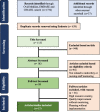Strengthening quality in sexual, reproductive, maternal, and newborn health systems in low- and middle-income countries through midwives and facility mentoring: an integrative review
- PMID: 37798690
- PMCID: PMC10552246
- DOI: 10.1186/s12884-023-06027-0
Strengthening quality in sexual, reproductive, maternal, and newborn health systems in low- and middle-income countries through midwives and facility mentoring: an integrative review
Abstract
Background: There is an urgent global call for health systems to strengthen access to quality sexual, reproductive, maternal, newborn and adolescent health, particularly for the most vulnerable. Professional midwives with enabling environments are identified as an important solution. However, a multitude of barriers prevent midwives from fully realizing their potential. Effective interventions to address known barriers and enable midwives and quality sexual, reproductive, maternal, newborn and adolescent health are less well known. This review intends to evaluate the literature on (1) introducing midwives in low- and middle-income countries, and (2) on mentoring as a facilitator to enable midwives and those in midwifery roles to improve sexual, reproductive, maternal, newborn and adolescent health service quality within health systems.
Methods: An integrative systematic literature review was conducted, guided by the Population, Intervention, Comparison, Outcome framework. Articles were reviewed for quality and relevance using the Gough weight-of-evidence framework and themes were identified. A master table categorized articles by Gough score, methodology, country of focus, topic areas, themes, classification of midwives, and mentorship model. The World Health Organization health systems building block framework was applied for data extraction and analysis.
Results: Fifty-three articles were included: 13 were rated as high, 36 as medium, and four as low according to the Gough criteria. Studies that focused on midwives primarily highlighted human resources, governance, and service delivery while those focused on mentoring were more likely to highlight quality services, lifesaving commodities, and health information systems. Midwives whose pre-service education met global standards were found to have more efficacy. The most effective mentoring packages were comprehensive, integrated into existing systems, and involved managers.
Conclusions: Effectively changing sexual, reproductive, maternal, newborn and adolescent health systems is complex. Globally standard midwives and a comprehensive mentoring package show effectiveness in improving service quality and utilization.
Trial registration: The protocol is registered in PROSPERO (CRD42022367657).
Keywords: Health systems strengthening; Maternity care; Mentoring; Midwives; Quality.
© 2023. BioMed Central Ltd., part of Springer Nature.
Conflict of interest statement
The authors declare no competing interests.
Figures
References
-
- World Health Organization. The Network for Improving Quality of Care for Maternal, Newborn and Child Health (Quality of Care Network). 2023. Available from: https://www.who.int/groups/Quality-of-care-network#:~:text=of%20Care%20N.... Accessed 1 Mar 2023.
-
- Renfrew MJ, McFadden A, Bastos MH, Campbell J, Channon AA, Cheung NF, et al. Midwifery and quality care: findings from a new evidence-informed framework for maternal and newborn care. Lancet. 2014;384:1129–45. - PubMed
-
- Turkmani S, Currie S, Mungia J, Assefi N, Rahmanzai AJ, Azfar P, et al. ‘Midwives are the backbone of our health system’: lessons from Afghanistan to guide expansion of midwifery in challenging settings. Midwifery. 2013;29:1166–72. - PubMed
Publication types
MeSH terms
LinkOut - more resources
Full Text Sources
Medical
Miscellaneous



